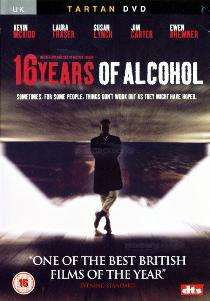16 Years of Alcohol
16 Years of Alcohol is a 2003 drama film written and directed by Richard Jobson, based on his semi-autobiographical 1987 novel.[2][3] Kevin McKidd plays the central character Frankie, a violent alcoholic who is partially based on Jobson and his brother. The cover of the DVD describes the film as influenced by A Clockwork Orange and Trainspotting.
| 16 Years of Alcohol | |
|---|---|
 | |
| Directed by | Richard Jobson |
| Produced by | Hamish McAlpine |
| Written by | Richard Jobson |
| Starring | Kevin McKidd Iain De Caestecker Susan Lynch Ewen Bremner Laura Fraser Allison McKenzie |
| Music by | Keith Atack (score)[1] |
| Distributed by | Metro Tartan |
Release date |
|
Running time | 102 min. |
| Country | Scotland |
| Language | English |
The film is Jobson's first directorial effort, following a career as a television presenter on BSkyB and VH-1, and as the vocalist for the 1970s punk rock band The Skids.[4] At the 2003 British Independent Film Awards, the film was nominated for best independent film, and Susan Lynch won the best supporting actor/actress category.
The movie was set and filmed in Edinburgh and Aberdour.[5] The soundtrack features 1960s ska and skinhead reggae acts such as Desmond Dekker and Claudette and the Corporation, as well as 1970s rock bands such as Roxy Music, Velvet Underground, Iggy & The Stooges and The Skids.
Plot
The opening scene shows Frankie being beaten by a small group of men, and the rest of the film is shown as a flashback leading up to that point. The film is split into three sections: Frankie's troubled childhood, his violent adolescence as a ska-loving skinhead who commands a small gang, and a period of change, in which Frankie tries to believe in hope and love.
Frankie starts a relationship with Helen (Laura Fraser), a young woman who studies art and works in a record store. When the differences between them became too obvious, Helen breaks up with Frankie, and he joins Alcoholics Anonymous (or a similar program) and a theatre group along with Mary (Susan Lynch), a good-hearted alcoholic. This allows Frankie to exorcise some of his demons, and he loses his desire to fight. An incident in a pub leads Frankie to believe that Mary is cheating on him with the theatre group's director. This reignites doubts created by his parents a long time ago. Feeling deceived, Frankie rejects Mary without a valid reason. When he's preparing to drink a glass of scotch, he begins to muse how the past has destroyed his life up to this point and he decides to stay sober and call Mary to apologise. The events merge with the beginning of the film, and Frankie's former comrades chase and beat him up. Whether Frankie dies or not is left open to the viewer.
References
- "Archived copy". Archived from the original on 20 December 2014. Retrieved 3 January 2015.CS1 maint: archived copy as title (link) Keith Atack (score)
- "16 Years of Alcohol (2003)". IMDb. Retrieved 28 May 2012.
- "16 Years Of Alcohol (DVD) - Richard Jobson". Retrieved 23 March 2017.
- "16 Years of Alcohol (2003)". Rotten tomatoes. Retrieved 28 May 2012.
- Dawson, Tom. "Movies-16 Years Of Alcohol (2004)". BBC. Retrieved 28 May 2012.